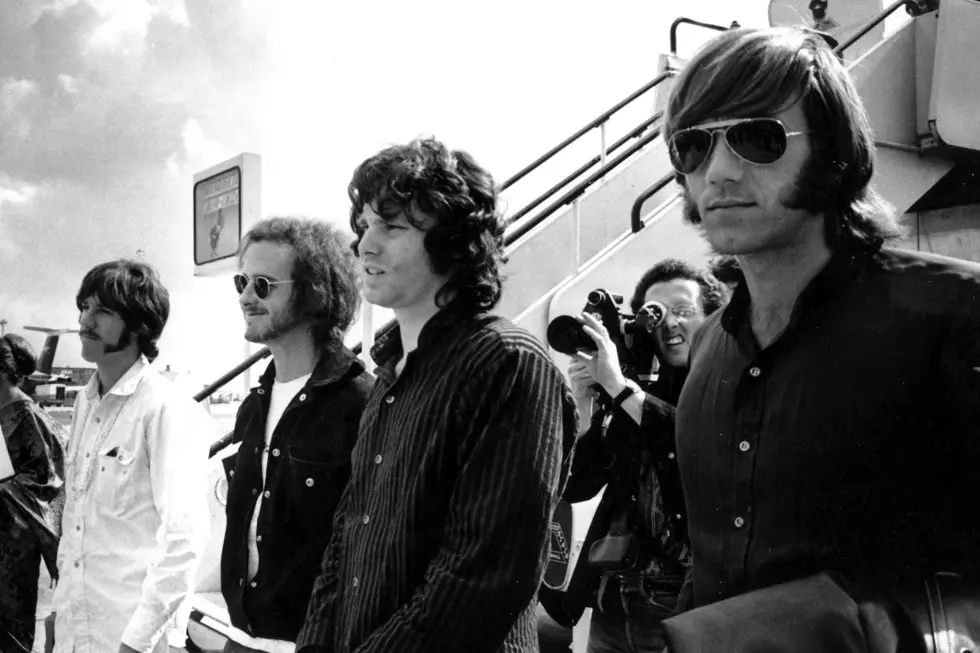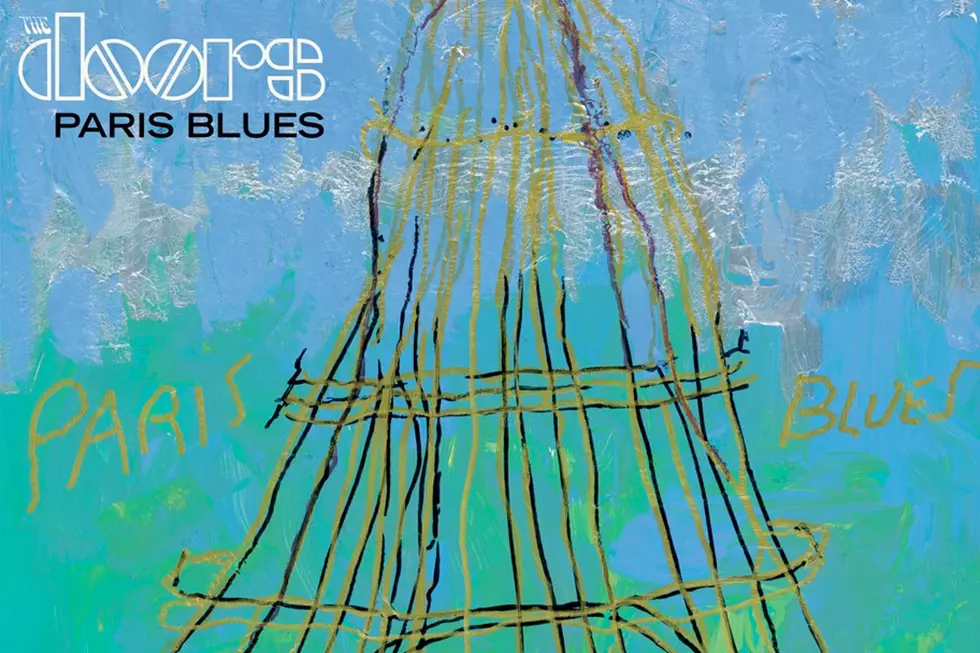
Ray Manzarek on Working with Roy Rogers, Robbie Krieger, Sly Stone and Warren Zevon
Ray Manzarek is having his most Doors-y year since Jim Morrison died four decades ago.
The Doors keyboardist is touring behind 'Translucent Blues,’ a dark new disc with singer-slide guitarist Roy Rogers, who’s also a Grammy-winning producer. Diehard Doors fans will find the project’s heavy vibes and pulsing blues sound familiar. Some lyrics for the project came from Warren Zevon, Jim Carroll, and other poet pals.
If you’d rather have songs from Jim Morrison, classic rock’s poet laureate, Manzarek is serving those up, too. He’s working with Doors bandmate Robby Krieger again, having relaunched their on-again-off-again Doors tribute touring band. Previous singers have included the Cult’s Ian Astbury, and the latest frontman hails from a Doors cover band.
Manzarek told Ultimate Classic Rock about this year’s projects, including his appearance on the new Sly Stone album and the upcoming expanded reissue of ‘L.A. Woman.’ Upbeat and happy, he gladly talked about his biggest band, his late friend and singer, Morrison’s recent posthumous pardon on obscenity charges from a famous concert, how he scored some of Zevon’s last lyrics, and more:
Your appearance on the new Sly Stone record (‘I’m Back! Family and Friends’)—how did that come together?
I know a guy who works with Cleopatra Records. And he gave me a call and said, “Hey they’re putting together a Sly Stone thing. Do you want to be one of the guest artists?” And I said, “I sure do.” And they came back and said, “Great, we’re really excited about having you, how about playing on ‘Dance to the Music’?” I said, “Well, that’s fine with me. Let’s do it.” It’s as simple as that.
Were you a big fan back in the day?
Who wasn’t? My God, anybody walking on the planet who had access to a television, turntable or radio was a big fan of Sly and the Family Stone. We loved him, all the Doors did.
Did you actually cross paths with him?
Never. I’ve played with the man, but never actually seen the man in person. That’s modern technology. I went to a studio in Sausalito, up in Northern California, in the Napa Valley, right on the water in the San Francisco Bay—I moved up there. I don’t live in L.A. anymore.
Did you have any marching orders on what to do?
Yeah: Play the s--- out of it. Play whatever the f--- you feel. That’s a direct quote—from me.
Did you talk to him directly at any point?
No. They just sent me the track.
So you don’t have insight into the alternate dimension he may or may not reside in at this point?
No. But I have the album in front of me. He’s lookin’ good. I don’t know what his plans are. I hope he’ll go on the road. That’s what we all want to see.
Was it your idea to briefly interpolate 'Light My Fire,' then?
Absolutely. Everything on there [was]. Everything except 'Dance to the Music' was the idea of Ray and his devilish little fingers. On the ends of my hand, I have ten little monsters, you never know what they’re going to do.
Have you heard the rest of the album?
If you’re asking me what my second favorite to 'Dance to the Music,' it’s 'I Want to Take You Higher' — in classic Doors fashion. And I do believe he says in there, “Baby baby baby, light my fire.” Ann Wilson is cool. And my gosh, Jeff Beck’s on there, too.
‘Translucent Blues’ is interesting because, although it doesn’t sound like the Doors, in a lot of ways, it has a Doors-like ambiance.
A lot of people have said, “It sounds like the Doors!” It doesn’t sound like the Doors! “Well, it sounds like you playing. And when you play, it sounds like the Doors!” Well, that’s the way I play.
How did you hook up with Roy?
We have the same agent, so he put us together. He said, “Why don’t you guys get together? You’re old blues cats, and you’ve been around and played the blues all your lives, practically.” This was about four, five years ago, and we played some gigs and finally made a record.
We tried to take the blues and expand them into a 21st century framework. It’s not the 12-bar blues, two lines, and then the third line answering the two lines and repeating. It’s expanded. It’s poetry. And hardcore, kickass, burning, smokin’ blues. I talked to my poet buddies and got some poetry from them.
We’ve got Warren Zevon, who, before he passed on, sent me two stanzas. I ran into Warren in Barney’s Beanery in Los Angeles and said, “Hey, Warren, I need some lyrics. We’re putting together a blues album. I need something dark and Raymond Chandler, that dark side of Los Angeles.
He said, “You’ve come to the right man.” I said, “I know I have, man. So let’s see if we can put a song together. Send me the lyrics.” He said, “Well, I’ll do what I can Ray—I’ll be dead in six months.” “What? Get out of here!” He said, “Lung cancer. I got six, eight months on the planet, I’m a dead man.” I said, “Well—“ He said, “No, no. Dark, Raymond Chandler, back alleys. That’s me.” It’s called 'A River of Madness Running Through L.A.' It’s really cool stuff. Michael McClure, his piece is called 'Kick.' It’s about getting rid of that white powder habit.
The upper white powder or the downer white powder?
The upper white powder, the uptown white powder. Jim Carroll’s a downtown white powder man. We’ve got the late Jim Carroll of The Basketball Diaries writing two songs, 'Hurricane' and 'Tension.' The lyrics of 'Tension' are about being in the madhouse, spending a bit of time in the quote-unquote insane asylum. Jim knows those hospitalizations quite well. And 'Hurricane' is about a hurricane coming up the East Coast.
Is it really necessary to f--- your life up to have interesting lyrics?
Hell no. You can write depressing lyrics if you’ve ever had the blues. These poor guys, there’s something about being poets and singers—the word men tend to go alcoholic. Like at Morrison. Poor Jim just could not put down the bottle. It probably did him in Paris, for all we know. I’d still be with my lead singer if he hadn’t gone to Paris—dangerous city. Go anywhere, go to London. So it’s absolutely not necessary.
Do you see addiction as a disease? Do you subscribe to that viewpoint that categorizes it that way?
Addiction to heroin is a lack of father -- total Freudian here -- it’s a lack of father protecting and hugging you when you’re an infant child. The touch of heart to heart, the heart-to-heart body… You’re holding your little boy -- your little girl -- but mainly your little boy, and you’re pressing him up against your heart charka. And that warmth instills a great courage into a child that allows it to stand free, self-sufficiently, without an artificial crutch. And that’s what heroin is, ultimate: It spreads a warm through your body. But if you can spread that same warmth through loving somebody, you have no need for the white powder.
What are you playing on the tour?
We’re playing the album, and we throw in a couple of Doors songs. We play ‘Translucent Blues,’ which really smokes. It’s strong and hard as we can play. A couple of critics have said, “Can you let up a little?”
Which Doors songs?
I’m not telling, man! That’s the secret. We’ll play a couple Doors songs that will be appropriate for the set.
What’s coming up on the ‘L.A. Woman’ reissue?
That’ll be a bunch of outtakes, as well as remixed-remastered [tracks]. You’ll also get a bonus disc of outtakes and conversations and a never-before-heard blues medley between an original blues, 'She Smells So Sweet,' coupled with a slow blues song, not an original.
The Doors of the 21st Century projects, did you consider doing any live releases with those bands? Or were there rights issues?
Not so much that. Those songs have already been recorded. And the best way to participate in an evening like that is to come to the shows and be there, live.
In retrospect, how do you think those worked out?
You’d have to ask the audience. The audience obviously loved it. But holy cow, did we get some bad reviews.
Ian [Astbury] was an intriguing choice. Why wasn’t he around for the second round?
He went back with the Cult.
Did you audition anybody besides Brent [Scallions] from Fuel?
Not really. We saw some video with Fuel. He came out and sang the songs. We said, “Fine. You’ve got the gig. You’re great.” Sounds great, let’s do it. We’re doing it [now] with a guy named Dave Brock. He knows the material—he’s been doing the material for 20 years with a band called Wild Child. So it was an automatic fit. We just played Orange County. There were 8,000 people just screaming.
What’s it called this time?
Ray Manzarek and Robby Krieger of the Doors, just so you know who it is.
Do you find it weird still talking about things you did when you were 25?
Igor Stravinsky did ‘The Rite of Spring’ until he was dead. That’s what happens, man: You record this stuff in your 20s, and you spend the rest of your life playing it.
Do you have good days and bad days dealing with it?
Well, you don’t play it all the time. I’ve been doing other things with my life besides playing 'Light My Fire.' We still play it, but it’s always an improvisation—did John Coltrane get tired of playing 'My Favorite Things?' You get all these chances to stretch out on the basic framework. Besides, the audience loves the song, you pick up the vibe from the audience, and it becomes a frenzy.
Morrison being pardoned in Florida, did that strike a chord with you?
I thought that was great. What the hell did he get busted for in the first place? Like Charlie Crist the [Florida] governor said, you’ve got photos of everything, a stack of 100 photos offered as evidence -- not a single photo of the ivory shaft. It was a big phony. [Morrison] never did it, that I saw. He threatened to do it, and he said he was going to do it—and I think he hypnotized 14,000 mad, packed teenagers, hot and sweaty, in a tribal rite of fear and desire in Florida, his hometown, where they know about snakes. And he was the Lizard King. It was a vision, a vision of the devil! They were spooked!
More From Ultimate Classic Rock









